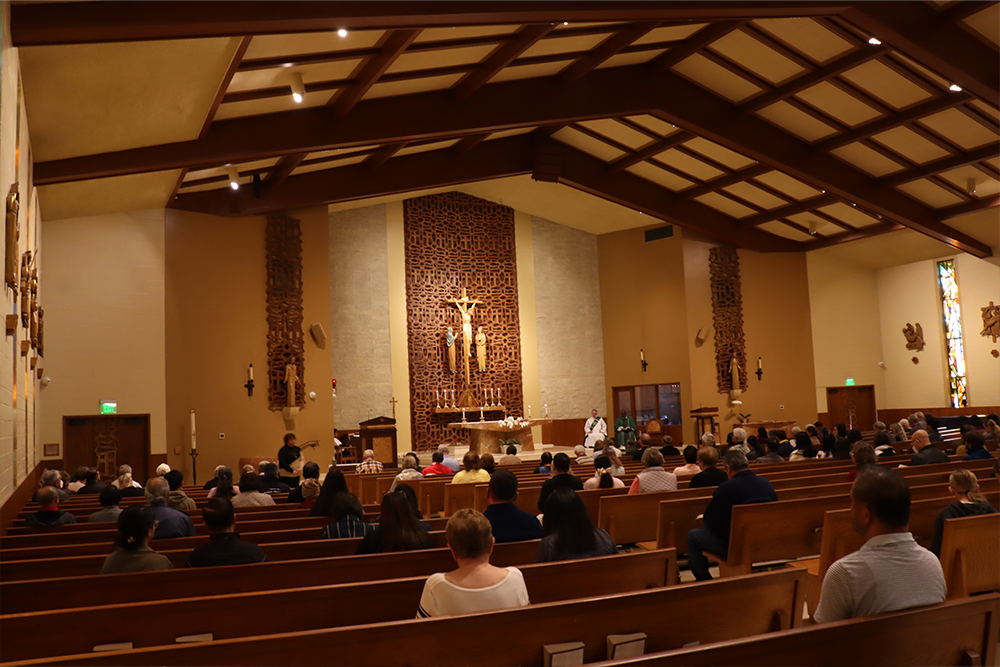Saints Cornelius, Pope, and Cyprian, Bishop, Martyrs on Saturday of week 23 in Ordinary Time  Saint Cyprian Catholic Church, Long Beach, CA Readings at MassLiturgical Colour: Red. Year: A(I). These are the readings for the feria
Christ Jesus came into the world to save sinnersHere is a saying that you can rely on and nobody should doubt: that Christ Jesus came into the world to save sinners. I myself am the greatest of them; and if mercy has been shown to me, it is because Jesus Christ meant to make me the greatest evidence of his inexhaustible patience for all the other people who would later have to trust in him to come to eternal life. To the eternal King, the undying, invisible and only God, be honour and glory for ever and ever. Amen.
May the name of the Lord be blessed for evermore! or Alleluia! Praise, O servants of the Lord, praise the name of the Lord! May the name of the Lord be blessed both now and for evermore! May the name of the Lord be blessed for evermore! or Alleluia! From the rising of the sun to its setting praised be the name of the Lord! High above all nations is the Lord, above the heavens his glory. May the name of the Lord be blessed for evermore! or Alleluia! Who is like the Lord, our God, who has risen on high to his throne yet stoops from the heights to look down, to look down upon heaven and earth? From the dust he lifts up the lowly, from the dungheap he raises the poor May the name of the Lord be blessed for evermore! or Alleluia!
Alleluia, alleluia! I am the Way, the Truth and the Life, says the Lord; No one can come to the Father except through me. Alleluia!
Alleluia, alleluia! If anyone loves me he will keep my word, and my Father will love him, and we shall come to him. Alleluia!
Whoever hears me builds his house on a rockJesus said to his disciples: ‘There is no sound tree that produces rotten fruit, nor again a rotten tree that produces sound fruit. For every tree can be told by its own fruit: people do not pick figs from thorns, nor gather grapes from brambles. A good man draws what is good from the store of goodness in his heart; a bad man draws what is bad from the store of badness. For a man’s words flow out of what fills his heart. ‘Why do you call me, “Lord, Lord” and not do what I say? ‘Everyone who comes to me and listens to my words and acts on them – I will show you what he is like. He is like the man who when he built his house dug, and dug deep, and laid the foundations on rock; when the river was in flood it bore down on that house but could not shake it, it was so well built. But the one who listens and does nothing is like the man who built his house on soil, with no foundations: as soon as the river bore down on it, it collapsed; and what a ruin that house became!’ These are the readings for the memorial
Such an overwhelming power comes from God and not from usWe are only the earthenware jars that hold this treasure, to make it clear that such an overwhelming power comes from God and not from us. We are in difficulties on all sides, but never cornered; we see no answer to our problems, but never despair; we have been persecuted, but never deserted; knocked down, but never killed; always, wherever we may be, we carry with us in our body the death of Jesus, so that the life of Jesus, too, may always be seen in our body. Indeed, while we are still alive, we are consigned to our death every day, for the sake of Jesus, so that in our mortal flesh the life of Jesus, too, may be openly shown. So death is at work in us, but life in you. But as we have the same spirit of faith that is mentioned in scripture – I believed, and therefore I spoke – we too believe and therefore we too speak, knowing that he who raised the Lord Jesus to life will raise us with Jesus in our turn, and put us by his side and you with us. You see, all this is for your benefit, so that the more grace is multiplied among people, the more thanksgiving there will be, to the glory of God.
Those who are sowing in tears will sing when they reap. When the Lord delivered Zion from bondage, it seemed like a dream. Then was our mouth filled with laughter, on our lips there were songs. Those who are sowing in tears will sing when they reap. The heathens themselves said: ‘What marvels the Lord worked for them!’ What marvels the Lord worked for us! Indeed we were glad. Those who are sowing in tears will sing when they reap. Deliver us, O Lord, from our bondage as streams in dry land. Those who are sowing in tears will sing when they reap. Those who are sowing in tears will sing when they reap. They go out, they go out, full of tears, carrying seed for the sowing: they come back, they come back, full of song, carrying their sheaves. Those who are sowing in tears will sing when they reap.
Alleluia, alleluia! Blessed be God, a gentle Father and the God of all consolation, who comforts us in all our sorrows. Alleluia!
Father, keep those you have given me true to your nameJesus raised his eyes to heaven and said: ‘Holy Father, keep those you have given me true to your name, so that they may be one like us. While I was with them, I kept those you had given me true to your name. I have watched over them and not one is lost except the one who chose to be lost, and this was to fulfil the scriptures. But now I am coming to you and while still in the world I say these things to share my joy with them to the full. I passed your word on to them, and the world hated them, because they belong to the world no more than I belong to the world. I am not asking you to remove them from the world, but to protect them from the evil one. They do not belong to the world any more than I belong to the world. Consecrate them in the truth; your word is truth. As you sent me into the world, I have sent them into the world, and for their sake I consecrate myself so that they too may be consecrated in truth.’
Christian Art Each day, The Christian Art website gives a picture and reflection on the Gospel of the day. The readings on this page are from the Jerusalem Bible, which is used at Mass in most of the English-speaking world. The New American Bible readings, which are used at Mass in the United States, are available in the Universalis apps, programs and downloads. |



